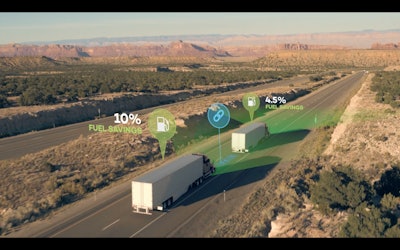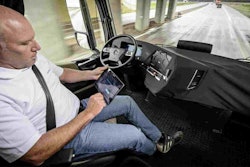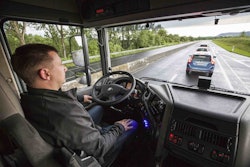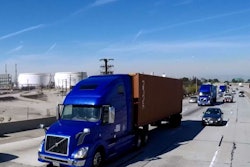 Peloton unveiled its platooning system in Detroit in Setpember 2014. Since, it’s announced partnerships with Volvo and Omnitracs.
Peloton unveiled its platooning system in Detroit in Setpember 2014. Since, it’s announced partnerships with Volvo and Omnitracs.A bill in the Iowa state legislature this session would open the door for truck platoons to begin operating on the state’s highways as a means to test the technology and fine tune it for wider scale deployment.
House Study Bill 111, introduced Feb. 14 and cleared Feb. 22 by a subcommittee in the state’s legislature, allows trucks using autonomous technology like adaptive cruise control or cooperative cruise control to narrow their following distance to enter into truck platoons. Current Iowa law restricts trucks from following within 300 feet of the vehicle in front of them, punishable by tickets of up to $1,000.
Though the bill has a few steps to clear before becoming law, such as passing both chambers of the state’s legislature and receiving a signature from the governor, platoons could begin traversing the state’s highways within a year, says Mark Lowe, interim director of the state’s DOT.
His department supports the legislation’s’ passage, Lowe said.
“As the operator of a transportation system, we have a role in safely letting innovation grow,” he said. “What we get out of it is being better positioned to understand the future of our transportation system — what it will look like and how it will function.”
Truck platooning systems have been developed by truck makers like Daimler and Navistar, as well as tech companies like Peleton, one of the key drivers of the technology.
The operational details vary system to system, but platoons form via a combination of vehicle-to-vehicle communication, GPS positioning, radar and camera systems, telematics systems and more. Platooning systems combine many tech systems already available from most truck manufacturers today. The North American Council on Freight Efficiency last year issued a report last year concluding platoons can boost fuel economy and productivity.
Lowe stressed the state isn’t investing any money into the development or deployment of the technology, but simply giving private sector manufacturers space to explore. “We’re creating an environment for private innovation, to help guide that safely without limiting it or defining it,” he says.
The state is currently working to define what Lowe called “autonomous vehicle proving grounds” around the state. Iowa DOT has partnered with the University of Iowa and Iowa State University “on concepts of how we start to work with different automated or smart vehicle technologies,” Lowe said. Truck platooning, he adds, “is just a piece of that.”










